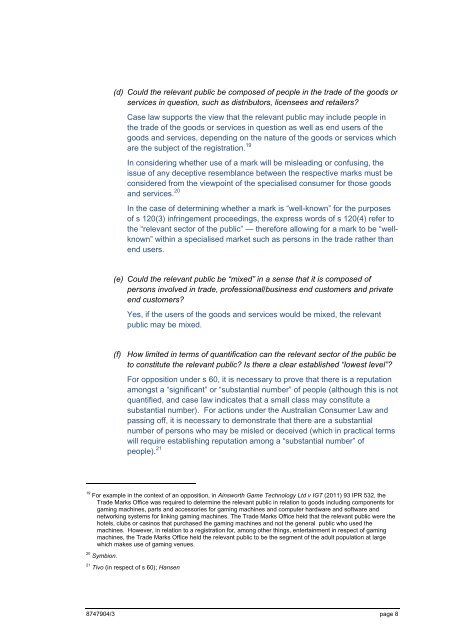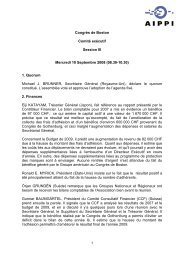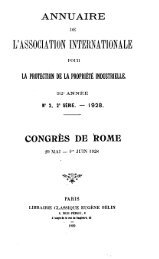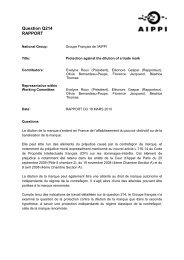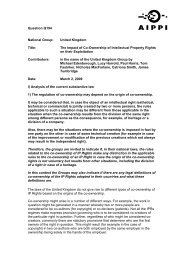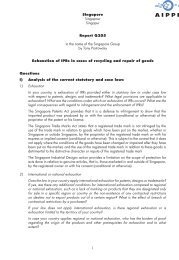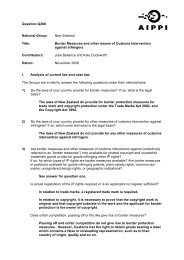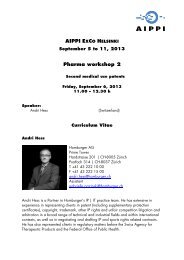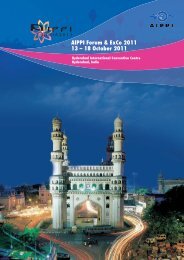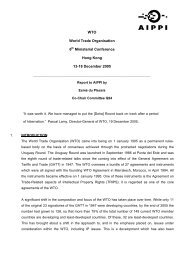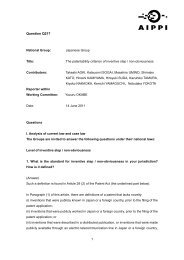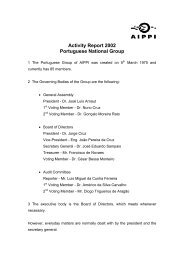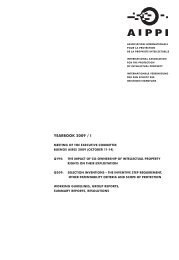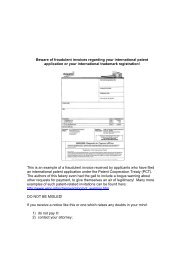Question Q234 National Group: Australia Title: Relevant ... - AIPPI
Question Q234 National Group: Australia Title: Relevant ... - AIPPI
Question Q234 National Group: Australia Title: Relevant ... - AIPPI
You also want an ePaper? Increase the reach of your titles
YUMPU automatically turns print PDFs into web optimized ePapers that Google loves.
(d) Could the relevant public be composed of people in the trade of the goods or<br />
services in question, such as distributors, licensees and retailers?<br />
Case law supports the view that the relevant public may include people in<br />
the trade of the goods or services in question as well as end users of the<br />
goods and services, depending on the nature of the goods or services which<br />
are the subject of the registration. 19<br />
In considering whether use of a mark will be misleading or confusing, the<br />
issue of any deceptive resemblance between the respective marks must be<br />
considered from the viewpoint of the specialised consumer for those goods<br />
and services. 20<br />
In the case of determining whether a mark is “well-known” for the purposes<br />
of s 120(3) infringement proceedings, the express words of s 120(4) refer to<br />
the “relevant sector of the public” — therefore allowing for a mark to be “wellknown”<br />
within a specialised market such as persons in the trade rather than<br />
end users.<br />
(e) Could the relevant public be “mixed” in a sense that it is composed of<br />
persons involved in trade, professional/business end customers and private<br />
end customers?<br />
Yes, if the users of the goods and services would be mixed, the relevant<br />
public may be mixed.<br />
(f) How limited in terms of quantification can the relevant sector of the public be<br />
to constitute the relevant public? Is there a clear established “lowest level”?<br />
For opposition under s 60, it is necessary to prove that there is a reputation<br />
amongst a “significant” or “substantial number” of people (although this is not<br />
quantified, and case law indicates that a small class may constitute a<br />
substantial number). For actions under the <strong>Australia</strong>n Consumer Law and<br />
passing off, it is necessary to demonstrate that there are a substantial<br />
number of persons who may be misled or deceived (which in practical terms<br />
will require establishing reputation among a “substantial number” of<br />
people). 21<br />
19<br />
For example in the context of an opposition, in Ainsworth Game Technology Ltd v IGT (2011) 93 IPR 532, the<br />
Trade Marks Office was required to determine the relevant public in relation to goods including components for<br />
gaming machines, parts and accessories for gaming machines and computer hardware and software and<br />
networking systems for linking gaming machines. The Trade Marks Office held that the relevant public were the<br />
hotels, clubs or casinos that purchased the gaming machines and not the general public who used the<br />
machines. However, in relation to a registration for, among other things, entertainment in respect of gaming<br />
machines, the Trade Marks Office held the relevant public to be the segment of the adult population at large<br />
which makes use of gaming venues.<br />
20<br />
Symbion.<br />
21<br />
Tivo (in respect of s 60); Hansen<br />
8747904/3 page 8


